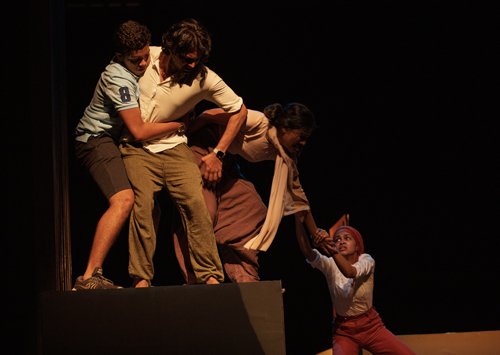PING! Tackling taboo issues in society

A heart-stopping moment: The rescue of Dirk and Jah. Pic by Prauda Buwaneka
The Stages Youth Ensemble blew their eager audience away with an original production of PING! Virtually everything is fine, directed by Ruwanthie De Chickera and Lihan Mendis.
Apart from the title suggesting a straightforward touch on the awareness of the detrimental effects of digital dependence amongst the youth, the play effectively brought to light certain issues masked by contemporary cultural constraints in Sri Lanka, portrayed through the lives of four families, who unearth the cracks in their relationships as the misuse of technology gradually spells chaos amongst them.
Set during the time of the pandemic, the curtain opens to a first look at the Anthonisz family, where we are introduced to Johann, (played by Sasindu Randeepa), a quite exceptionally done representation of the Lankan household father figure. Contributing to the strained relationship between the parents of this family is the closed off behaviour of their son, Dirk (played by Vishwa Wijesooriya) – with a most compelling “secret” central to the issues addressed in the play. From his first appearance on stage, one can tell that the boy is markedly troubled. As the play progresses, what ultimately resides in his mind is revealed, a truth shockingly unsettling but heartbreaking, nonetheless.
In a heart-to-heart conversation in the balcony between Dirk and Shehan – father of the Dias family (played by Ganan Kugan on Day 01), right after Dirk attempts to end his life, the audience finds out what is really going on, and this becomes the turning point of the play. It is indeed an unexpected twist as the issue resides in the ‘taboo’ category of conversation in Sri Lanka. Homosexuality for example, even though still unaccepted in the country, is something that is brought to light to some extent unlike the issue at hand. Dirk’s confession relates to a more disturbing issue.
This only adds great effect to the final scene of the play; an emotional climax where a destructive text message is crafted to send to Ayana, Dirk’s sister (played by Nikhita Abeywickrema) “outing” Dirk. Just when the audience feels a sense of relief after finding out that the message had not yet been read by Ayana, a haunting “Ping” is heard from the phones of all families on stage during the wholesome embrace between the siblings.
A huge commendation to the young actors, as their portrayal of their characters came through quite brilliantly, appropriately coinciding with the unraveling of each unpredictable event. Special mentions to Hajarah Faleel (Noora Salim) Akhil Skanthakumar (Shakeel Salim), Akmal Hamid (Rainn/Rehan Dias) and Nethra Peiris (Kaya Yoganathan) – all characters representing typical negative Lankan stereotypes. ‘Rainn’, with his eccentric and flamboyant personality, reveals a dark and menacing side to himself as he turns on Dirk, blindly backing up Kaya’s accusation of sexual assault towards him as well. In reality, he was only projecting his frustration towards his own father being unable to accept him for who he was, and treating homosexuality as some sort of disfunction. Likewise, Kaya too was acting out mainly due to Dirk’s rejection of her advances, projecting her state of denial solely onto the unfortunate incident that overcame Dirk. Shakeel’s character, no doubt represents a good majority of young Sri Lankan boys with access to social media today; innocent confusion with the thoughtless use of disrespectful slurs and explicit language as a result of being chronically online.
Most plays have a linear plot line, with a general issue leading to a climax and ending with some resolution. The beauty of Ping! was that their issues of choice – of the impact of social media, of crumbling family relationships, etc, were already established through the manner of presentation. As the play progressed, the problems only branched out to become more complex, with there being no distinct resolution around the corner. The characters’ anxiety and feelings of helplessness were definitely felt by the audience that night.
The structure of a phone screen occasionally let down the top of the stage gave the audience a firsthand perspective of the teenagers’ conversations; an ingenious move in sustaining attention. Additionally, applause for the minimalistic but effective props, and the seamless transitions from scene to scene.
The cast and crew should be proud to have presented such an original and well executed production.
Searching for an ideal partner? Find your soul mate on Hitad.lk, Sri Lanka's favourite marriage proposals page. With Hitad.lk matrimonial advertisements you have access to thousands of ads from potential suitors who are looking for someone just like you.


